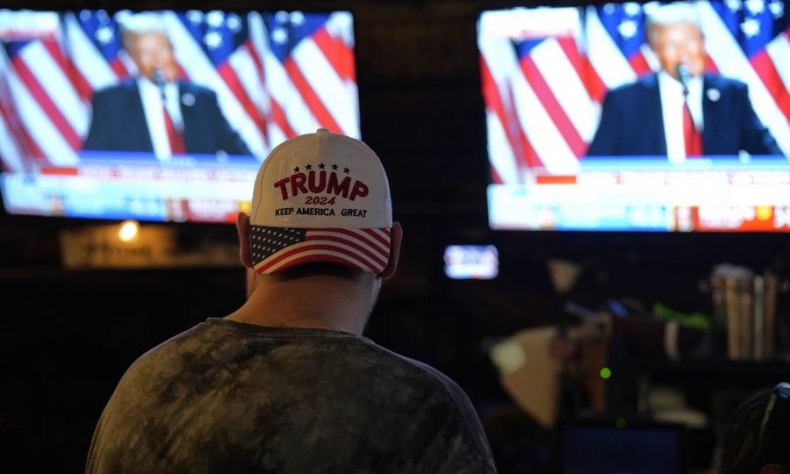China-U.S. Relations: A New Beginning?

Managing competition and cooperation between China and the U.S. will require a more pragmatic approach from the new U.S. administration.
After four years away from the White House, Donald Trump was re-elected president of the United States on November 5. Although this is an internal matter for the U.S., it has attracted global attention.
During his first term, Trump clearly was not exactly favored by the Chinese people. In 2018, he initiated a trade war against China and heavily promoted the so-called “China threat” throughout his presidency. His administration implemented measures to restrict the entry of Chinese students, scholars and journalists into the U.S., and made unsubstantiated claims against China, such as accusing the country of being responsible for the origins of COVID-19, which severely strained China-U.S. relations. After Trump lost the 2020 election, many in China expressed optimism for the incoming Joe Biden administration, hoping it would adopt a more objective approach to China-U.S. relations and the international landscape, and seek a path of development benefiting all of humanity.
Unfortunately, the Democratic administration largely continued its predecessor’s China policy and worked to build a closer and broader anti-China alliance, attempting to contain the country on all fronts. On August 2, 2022, then U.S. House Speaker Nancy Pelosi visited Taiwan region despite strong objections from the Chinese Government.
This move pointedly increased tensions in the Taiwan Straits, with its impact still felt today. While it is uncertain whether China-U.S. relations had hit their lowest point since the two sides established formal diplomatic relations on January 1, 1979, the reality is that Biden is the only U.S. president in the past 45 years who has not visited China during his term.
However, the U.S. strategy to contain China has not yielded visible benefits for the American public, nor has it fostered greater global unity and peace.
The trade war initiated in 2018 has now persisted for six years, yet China’s foreign trade remains largely unaffected. In fact, China’s exports grew 6.2 percent year on year in the first three quarters of this year. Meanwhile, high tariffs have negatively impacted the U.S. economy, contributing to sharply rising consumer prices and sustained inflation. This dual setback highlights a miscalculation by U.S. policymakers: Not only did their efforts to undermine a perceived adversary fall short, but they also failed to safeguard American interests in the process.

As Trump makes his political comeback, how he manages relations with China will be one of the priorities for the new administration to consider. His greatest advantage in this regard may be that he can draw lessons from his first term—as well as from his Democratic colleagues.
The key question is how the incoming Trump administration will define China-U.S. relations. Whether from the Republican or Democratic camp, no one within the U.S. leadership wishes to see competition between China and the U.S. escalate into full-blown conflict. China holds the same position on the matter. Within this framework, managing competition and cooperation between China and the U.S. will require a more pragmatic approach from the new U.S. administration.
The U.S. recognition of Taiwan as part of China, and of the government of the People’s Republic of China as the sole legitimate government representing China, has not only been the premise for the diplomatic relationship between the two countries, but also serves as the political foundation of their bilateral ties.
During Trump’s first term, although the two countries had several confrontations over the sensitive “Taiwan question,” these tensions were generally kept at a manageable level. If, in a new term, Trump is able to abide by the one-China principle—the bottom line in U.S.-China relations established by successive American administrations—the possibility for China-U.S. relations to improve steadily remains.
As the two largest economies in the world, China and the U.S. have immense potential for deeper cooperation in areas like space exploration, climate change, combating transnational drug trafficking and global poverty reduction. The arrival of a new U.S. administration could bring positive shifts, given that the global challenges we face today far surpass those encountered when Trump took office in 2017.
This is also China’s hope for the future of China-U.S. relations, as expressed in Chinese President Xi Jinping’s congratulatory message to President-elect Trump on November 7: “China hopes that the two sides will uphold the principles of mutual respect, peaceful coexistence and win-win cooperation, strengthen dialogue and communication, properly manage differences and expand mutually beneficial cooperation.”
“History teaches that China and the U.S. gain from cooperation and lose from confrontation. A stable, sound and sustainable China-U.S. relationship serves the two countries’ shared interests and meets the aspirations of the international community,” Xi stressed.
 Facebook
Facebook
 Twitter
Twitter
 Linkedin
Linkedin
 Google +
Google +










